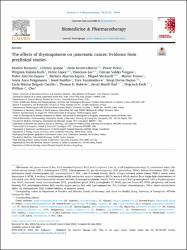| dc.contributor.author | Durna Daştan, Sevgi | |
| dc.date.accessioned | 2023-04-13T11:43:30Z | |
| dc.date.available | 2023-04-13T11:43:30Z | |
| dc.date.issued | 2022 | tr |
| dc.identifier.uri | http://dx.doi.org/10.1016/j.biopha.2022.113364 | |
| dc.identifier.uri | https://hdl.handle.net/20.500.12418/13673 | |
| dc.description.abstract | Thymoquinone (TQ) is a secondary metabolite found in abundance in very few plant species including Nigella
sativa L., Monarda fistulosa L., Thymus vulgaris L. and Satureja montana L. Preclinical pharmacological studies have
shown that TQ has many biological activities, such as anti-inflammatory, antioxidant and anticancer. Both in vivo
and in vitro experiments have shown that TQ acts as an antitumor agent by altering cell cycle progression,
inhibiting cell proliferation, stimulating apoptosis, inhibiting angiogenesis, reducing metastasis and affecting
autophagy. In this comprehensive study, the evidence on the pharmacological potential of TQ on pancreatic
cancer is reviewed. The positive results of preclinical studies support the view that TQ can be considered as an
additional therapeutic agent against pancreatic cancer. The possibilities of success for this compound in human
medicine should be further explored through clinical trials. | tr |
| dc.language.iso | eng | tr |
| dc.publisher | Elsevier BV | tr |
| dc.relation.isversionof | http://dx.doi.org/10.1016/j.biopha.2022.113364 | tr |
| dc.rights | info:eu-repo/semantics/openAccess | tr |
| dc.subject | thymoquinone, apoptosis, molecular mechanisms | tr |
| dc.title | The effects of thymoquinone on pancreatic cancer: Evidence from preclinical studies | tr |
| dc.type | article | tr |
| dc.contributor.department | Fen Fakültesi | tr |
| dc.contributor.authorID | 0000-0003-4946-5602 | tr |
| dc.identifier.volume | 153 | tr |
| dc.identifier.issue | 1 | tr |
| dc.identifier.endpage | 20 | tr |
| dc.identifier.startpage | 1 | tr |
| dc.relation.publicationcategory | Uluslararası Editör Denetimli Dergide Makale | tr |















